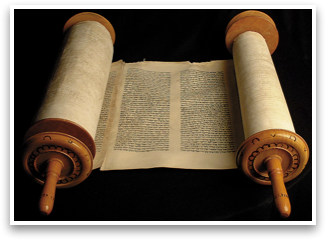
The Old Testament
Know as the Old Testament to Christians and simply as the Bible (or Hebrew Scriptures) to Jews, the books of the Bible from Genesis to Malachi contain a wide variety of literary genres that are united by one concern, to preserve the history of Israel, God's chosen people, from the early days of the patriarchs to the ultimate dissolution of the kingdom itself.
Despite the vast types of literature and wide range of human experiences present in the Old Testament, one constant is clear. The God of Abraham, Isaac, and Jacob is true to his covenant people, Israel.

Themes and Facts
- The vast majority of the Old Testament was written in Hebrew, though some sections of the book of Daniel were written in Aramaic.
- The traditional Jewish division of the Old Testament books is Torah, Prophets, and Writings.
- The OT canon was finalized by the 6th century B. C., perhaps by Ezra.
- The guiding criterion for canonicity was reception by the community of faith, especially by recognized religious leaders such as Moses, Solomon, the prophets.
- The Bible contains a wide range of literary genres – myth, poetry, history, letters, apocalyptic writings.
- The basic story of the Old Testament deals with God's dealings with the nation of Israel, setting them apart to be his chosen people.
- The oldest book in the Old Testament is often considered to be the book of Job, which is a book of theodicy, addressing why God allows "bad things to happen to good people."
Brief Summary of the Old Testament
In essence, the Old Testament is the story of Israel and their continuing covenant with God. Although the Old Testament begins with a cosmic focus (literally, the creation of the world), the focus narrows in Genesis 12 to the story of the Hebrews being chosen directly by God. As God’s chosen people, the Israelites were led out of bondage in Egypt to their eventual promised land, Canaan. The early story of Israel is inseparable from the story of the patriarchs (e.g. Abraham, Isaac, Jacob).
God gave Israel the law (e.g. the Ten Commandments) to help establish a personal relationship with them (and to provide much needed boundaries); however, they would continually rebel against divine proclamations though God was always a gracious Lord who would accept their return.
Although they were warned against it, Israel eventually demanded a king like neighboring nations. God acquiesced to their wishes; however, the beginning of the kingship was also, in many ways, the beginning of the end of Israel, with the kingdom eventually being divided in two (the northern kingdom of Israel and the southern kingdom of Judah) and ultimately conquered by other nations. The Old Testament ends with the promise of a Messiah who would ultimately save Israel.
Study Questions
- How would you describe the basic characteristics of Hebrew narrative? What are the literary strengths and weaknesses of the various writers?
- Why does God allow Job to suffer? What is Job's response to his suffering?
- In the end, what answer does God offer Job? Do you find it satisfying?
The Bible is the single most influential book in existence. It is the most widely-translated book ever and is perennially the best-selling book on the planet. It has influenced poets, novelists, philosophers, theologians, musicians, artists, and a few cult leaders here and there. Its influence is felt everywhere from “The Simpsons” to Handel’s “Messiah.” Authors as diverse as Aligheri Dante, William Shakespeare, John Milton, Flannery O’Connor, Saul Bellow, and Cormac McCarthy demonstrate its continued influence. From Seinfeld to Superman, the Bible has made an indelible mark on culture.